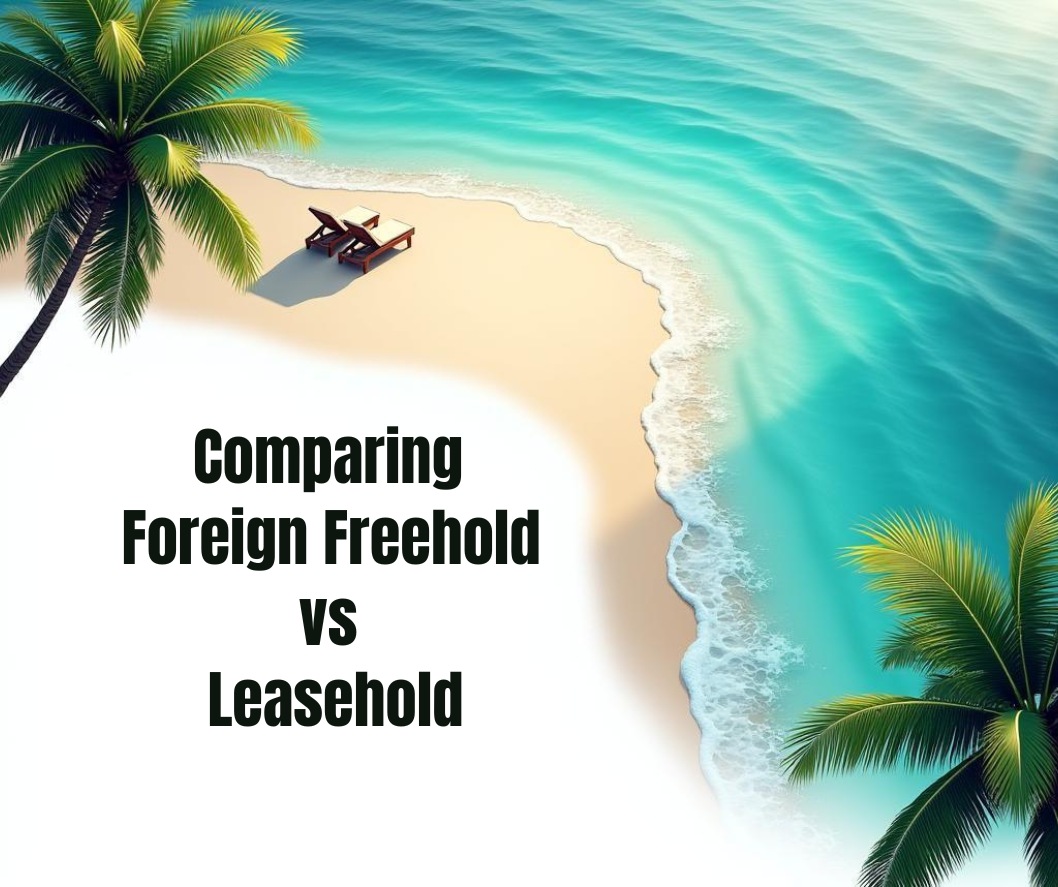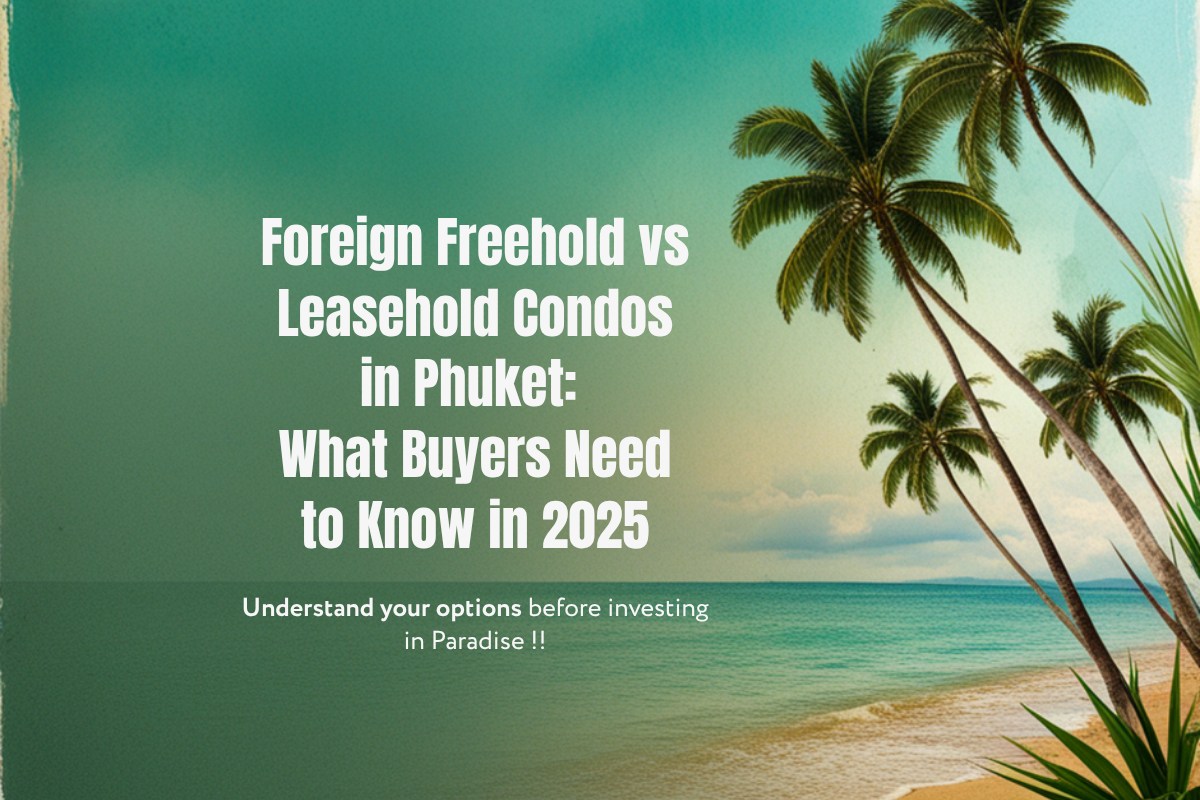Choosing Between Phuket Freehold vs Leasehold Condos: What to Weigh in 2025
Understanding the legal differences between Phuket freehold vs leasehold condos is essential for foreign buyers in Phuket. These two ownership structures operate under different legal frameworks, rights, renewal conditions, and transfer processes. In 2025, increased regulatory scrutiny and compliance standards have made clarity around ownership type more important than ever.
This article compares Phuket freehold vs leasehold condos within the current 2025 legal framework. It will help you navigate the pros, cons, and crucial legal differences between foreign freehold and leasehold in Phuket, so you can make a smart, secure investment.
What Is a Foreign Freehold Condo in Phuket?
A foreign freehold condominium unit is a condominium registered at the Land Office in which ownership of the specific unit is held directly in the foreign buyer’s personal name. Ownership is evidenced by a Chanote title deed for the unit, and includes a proportionate share of the common property of the building.
Under Thailand’s Condominium Act, foreigners may hold up to 49% of the total saleable floor area in a registered condominium development as foreign freehold title. When that quota is available, foreign freehold ownership is the most direct and transparent form of property ownership available to non-Thai nationals.
What Is a Leasehold Condo in Phuket?
Leasehold condominium ownership involves the foreign buyer holding long-term registered lease rights over a unit, rather than direct title ownership. Under Thai law, a lease may be registered for a maximum term of 30 years at the Land Office. This registration provides legal rights of use and occupation for the term of the lease.
Renewal periods (such as 30 + 30 years, or 30 + 30 + 30) may be referenced contractually, but renewal arrangements are not automatic under Thai law and must be assessed carefully. Where the foreign freehold quota is full, leasehold is often used as a compliant alternative structure, provided the lease is properly registered and documented.
Comparing Phuket Freehold vs Leasehold Condos

| Feature | Foreign Freehold | Leasehold |
| Ownership Type | Full ownership under Thai law | Long-term lease (possibly more renewals) |
| Title Deed | Your name on Chanote title deed | Thai owner retains title, lease registered |
| Security | Permanent, strong legal ownership | Contract-based, can vary by developer |
| Resale Value | Higher – more attractive to foreign buyers | Lower – lease term may deter some buyers |
| Inheritance Rights | Yes – can leave to heirs | Complex – legal advice required |
| Quota Limitation | Subject to 49% foreign ownership cap | No quota limit available to all |
Why Leasehold May Still Be Used in Phuket
Leasehold structures continue to be utilised when foreign freehold quota is unavailable or when buyers require a lower entry price point. Leasehold may also be applied where a project’s ownership framework has been structured specifically around registered lease agreements rather than foreign freehold allocation.
Other factors influencing the use of leasehold can include developer planning, title allocation strategy within a project, and circumstances where long-term use rights align with an owner’s intended time horizon of occupancy.
When considering leasehold, careful review of registration status, renewal clauses, and contract terms is essential.
Regulatory Considerations and Enforcement Trends (2025)
In some cases, foreign buyers have historically used Thai companies as holding vehicles within leasehold structures. Under Thai law, a Thai company is considered a Thai entity. However, regulators have increased scrutiny of company structures where beneficial ownership or shareholding arrangements appear inconsistent with the spirit of Thai foreign ownership limitations.
As a result, the compliance environment in 2025 places greater emphasis on transparent ownership pathways, either through legally allocated foreign freehold quota or properly registered leasehold rights. Each structure carries different governance, renewal, and documentation parameters, which should be reviewed carefully on a case-by-case basis.
How to Compare Ownership Structures Objectively
Foreign freehold provides a permanent legal title. Where it is available within the 49% foreign ownership quota, it typically offers the highest level of structural clarity and long-term security under Thai law.
Leasehold structures can still be suitable in specific circumstances. Examples include where the foreign quota is fully allocated in the chosen project, or where the buyer intends to hold the property for a defined period only. In these cases, leasehold suitability depends heavily on contract clarity, developer credibility, and renewal mechanisms being specifically documented.
These structural distinctions form the essential comparative variables when assessing ownership options.
Final Considerations Before Committing to an Ownership Structure
Before entering into any purchase agreement, buyers should:
-
verify the condominium’s foreign ownership quota status
-
have all contracts reviewed by an experienced Thai property lawyer
-
consider future resale implications based on tenure structure
-
avoid informal or non-transparent holding arrangements
Clear documentation, transparent governance, and compliance alignment continue to be central to long-term security and value preservation.
Summary
Foreign freehold and leasehold each provide legitimate pathways to condominium tenure in Phuket. The most suitable structure depends on quota availability, the nature of the development, and the buyer’s intended period of use. Understanding the legal framework, the rights attached to each structure, and the implications for future transfer or succession is essential prior to committing to a purchase.
For foreign buyers choosing between Phuket freehold vs leasehold condos, clarity of structure remains the defining variable in 2025.
FAQ: Phuket Foreign Freehold vs Leasehold Condos (2025)
Q: Is it better to buy a leasehold or freehold condo in Phuket?
A: Foreign freehold is usually better for long-term security, but leasehold can work well in some situations if structured properly and the freehold quota is full.
Q: Can I convert a leasehold to foreign freehold later?
A: Potentially, yes, but only if two conditions are met:
- Your lease agreement includes a conversion clause (which most do), and
- The condominium’s foreign freehold quota has not yet been fully allocated.
It’s always best to confirm both with your lawyer before proceeding.
Q: Can foreigners own land in Phuket freehold?
A: No, foreigners cannot legally own land in Thailand. They can own condo units (foreign freehold) or lease property.
Q: How long does a leasehold last?
A: Typically 30 years. Some contracts offer 30+30+30 renewals, but these need legal verification.
Q: Is leasehold legal and safe in 2025?
A: Yes, if the lease is properly registered and reviewed by a real estate lawyer. Avoid unregistered or informal agreements.
Disclaimer: The information contained in this article is provided for general informational purposes only and does not constitute legal, financial, or investment advice. While every effort has been made to ensure accuracy at the time of publication, property laws and regulations in Thailand are subject to change. Readers should always seek independent legal advice from a qualified Thai lawyer before making any property-related decision or transaction.


Social Contact